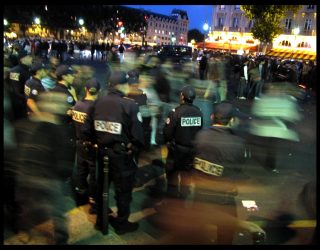Last year, the second season of Daredevil introduced the character of Frank Castle/The Punisher, portrayed by John Bernthal, into the Marvel Cinematic Universe. The character proved such a success that a 13-episode Punisher Netflix series is coming out on Friday.
While I’ve never been a fan of the Punisher and wasn’t enamored of his storyline on Daredevil, this fictional character has a real life public impact. Like most mainstream superheroes the Punisher has no stated political affiliations, but the character is heavily slanted towards the right-wing and perpetuates right-wing narratives.
Straight, white, cis male military veteran – a perfect match for the right-wing hero ideal
His branding, like that of the alt-right, gives him an appealing veneer which helps to normalize the fascistic outlooks he promotes – though in the Punisher’s case I’m sure this effect is unintentional.
His likeness and his distinctive skull logo have already become associated with ‘Blue Lives Matter’ paraphernalia, to the point of being featured on several Eastern Kentucky police cars until community protest caused the logo’s removal.
The Punisher skull logo has also been ubiquitous among the US military forces in Iraq and Afghanistan, appearing “on unofficial unit patches; spray-painted on buildings, vehicles, and equipment; and as military tattoos.”
One caveat before we begin: While in this article I occasionally reference his background in the comics, the bulk of my analysis focuses on the Marvel Cinematic Universe version of the Punisher, as portrayed by Bernthal. This was the incarnation introduced to me and currently distributed by Marvel/Netflix, and the one mainstream audiences will most easily recognize for the foreseeable future.
THE PUNISHER: THE MAKINGS OF A CRYPTO-FASCIST ICON
The character of Frank Castle first appeared in comics in 1974, as a Spider-Man antagonist who later teams up with Spidey against the story’s villain. However, the Punisher was preceded in literature by Mack Bolan a.k.a. ‘the Executioner’ who made his debut in the 1969 novel War Against the Mafia.
The genesis of the gun-toting vigilante hero was an explicit and conscious conservative backlash
Apart from their aliases, Castle and Bolan share many similarities in their biographies (fought in the Vietnam War, families murdered) and methods (taking the fight to the bad guys with guns, explosives and other military hardware). Like most superheroes, they’re rugged individuals who operate outside the law and often without the help of society at large.
They’re both straight, white, cis male military veterans – which isn’t inherently wrong from a left-wing perspective – but is a perfect match for the profile of the right-wing hero ideal.
Mack Bolan was the brainchild of writer Don Pendleton. Describing her late husband’s motivation in creating the character, Linda Pendleton explained:
“Don wrote the first novel in the series, War Against the Mafia out of his desire to express his discomfort with the reaction of many Americans to our soldiers who were dying for our country in the jungles of Vietnam and those coming home to outrageous verbal and physical abuse. So Mack Bolan became Don’s symbolic statement.”
The Punisher character is a textbook case of glorified toxic masculinity
The Bolan character thus originated as an attempt to rehabilitate the image of US soldiers – and by extension the US military – from disillusionment and hostility against the USA’s then-current imperialist wars in Vietnam, Cambodia and Laos.
In other words, the genesis of the gun-toting vigilante hero archetype pioneered by the Executioner and then epitomized by the Punisher was an explicit and conscious conservative backlash against the peace movement and anti-imperialist sentiments.
In explaining the appeal of the Bolan character to male readers, Linda Pendleton adds:
“Don also believed that the male attraction to Bolan had to do with the innate warrior essence that has basically been lost over the centuries. Men identify with Bolan’s warrior essence, even at a subliminal level, and in doing so, re-identify the male essence within self.”
This bit of militarist, gender essentialist claptrap is eerily reminiscent of Nazi pseudo historical/psychological gender narratives. It retains distressing mainstream stature even in present times, despite having been long since debunked by social science. The Punisher character is emblematic of this warped outlook – a textbook case of glorified toxic masculinity.
The Punisher only targets the villains of right-wing narratives and never their heroes
He’s violent, he’s strong and stoic, he expresses more anger than every other emotion combined, he never displays weakness even under torture, he has no apparent emotional relationships with anybody after his family is murdered, and he displays no traits or interests which could be classified as feminine.
Talk of “innate warrior essence” also brings to mind the words of the Kentucky police chief who earlier this year removed the Punisher skull from his patrol cars. In explaining why he initially approved the design, the chief said: “I’m not racist or anything like that… I consider it to be a ‘warrior logo.’ … That decal represents that we will take any means necessary to keep our community safe.”
When it comes to the targets of the Punisher’s violence, the Daredevil writers obviously wouldn’t be so crass as to have the Punisher massacring Muslims, people of color, undocumented people, trans people, or other marginalized peoples – they have him attack the next best thing from a right-wing perspective: drug gangs and street criminals. The left views street crime as a symptom of larger systemic problems; the right views street crime as the third biggest threat to law and order, after the vilified marginal population dou joure and the “radical left.”
He swaps colorful costumes and sci-fi weapons for a shirt, jeans and longcoat ensemble and plain old-fashioned guns
Since the Punisher only targets the villains of right-wing narratives and never targets their heroes (such as law enforcement or military figures), he’s an obvious character to be embraced and exploited by the right to advance violent, authoritarian agendas.
What makes the Punisher an especially attractive candidate for such appropriation is his unique facade of faux-realism which taps into and perpetuates some highly insidious cultural myths.
THE PUNISHER AND “REALISM”
Bernthal’s Punisher possesses several traits which set him apart from other Marvel superheroes. One important point is that his surface style projects an aura of gritty realism which disguises the many ways the character is as fantastical and preposterous as any other superhero. He swaps colorful costumes and sci-fi weapons for a shirt, jeans and longcoat ensemble and plain old-fashioned guns.
Whenever he perpetrates a mass killing, it miraculously transpires that everyone is guilty of something
On the surface, the Punisher appears to possess no super powers, not even super advanced armor or weaponry, which could trick less careful viewers into thinking they can potentially emulate him and produce similar outcomes. But if we examine the consequences of the Punisher’s actions carefully, we can see that he is in fact awash with super powers every bit as implausible in our own world as controlling the weather with a magic hammer or transforming into enormous green monsters.
First, Bernthal’s Punisher has the ability of knowing absolutely that all of the many, many people he targets are “bad people” who – under prevailing US paradigms – deserve the violent deaths he dispenses. He’s never mistaken about the guilt of his victims and whenever he perpetrates a mass killing, it miraculously transpires that every single person is guilty of something.
Similarly, he has magical shooting accuracy which ensures he never kills or injures the wrong person – an ability which is beyond even highly-trained military or law enforcement. The most brazen expression of this is the Punisher opening fire in the middle of a crowded hospital.
Daredevil depicts no negative social consequences to the Punisher’s murders
Granted, only killing “bad people” and never causing collateral damage are staples of the action adventure drama, but the Daredevil writers double down on this trope.
They repeatedly draw the other characters’ and the audience’s attention to Punisher’s completely artificial and plot-driven lack of collateral damage. The other characters, though revolted by the Punisher’s methods, never challenge him on this point.
Unfortunately, people in the real world also sometimes disregard the possibility of unintended consequences, with tragic results. Such was the case a few years ago when a Texas man attempted to foil a car-jacking in progress by shooting at the perpetrators, but only succeeded in hitting the victim in the head.
Daredevil also depicts no negative social consequences to the Punisher’s murders. This makes perfect sense if you believe Margaret Thatcher’s assertion that “there is no such thing as civil society.” In reality, every human being, no matter how vile or antisocial, exists within a complicated web of social relationships – some positive, some negative – which will be affected if they are violently removed from this world.
Fascism offers a simplistic worldview of sharply differentiated good and bad people
One blog for US veterans, discussing the popularity of the Punisher among the country’s armed forces, explains his appeal this way: “in a world of complex and nebulous threats where nothing is simple, the character offers readers a direct solution to incredibly complicated problems.” Which I suppose would be fair enough, if not for two crucial points.
The first is the lengths the show goes to in painting the Punisher’s actions and their results as realistic. The second is the existence and rising popularity in the United States of a political ideology which takes the fantasy of “a direct (ultraviolent) solution to incredibly complicated problems” as one of its core tenets. Whatever it chooses to call itself this movement is, at its heart, white supremacist and fascist.
Fascism, like all authoritarian ideologies, offers a simplistic worldview of sharply differentiated good people and bad people and promises it can easily make life better by brutalizing the bad people. By openly embracing and highlighting these misconceptions many people already have about the world and how it works, the writers of Daredevil – and, I fear, The Punisher – unintentionally reinforce a deeply problematic, fascist-friendly outlook.
Anthropologist David Graeber has previously made the case that superhero universes intrinsically operate on a logic where “fascism is the only political possibility.” They offer fairytale universes where good and bad people are discrete entities and often easily distinguishable.
The Punisher’s closest real-world equivalent is not the cop nor the soldier, but the mass shooter
In these worlds, the solution to pretty much any social problem is a violent response by the right person or people, who are always set above ordinary people in some way. Where the negative social consequences of their violence are either nonexistent or minor compared to the threats they prevent. The Punisher character takes this underlying logic, makes it explicit and openly celebrates it, upping the level of acceptable violence for good measure.
The Punisher’s closest real-world equivalent is not the cop nor the soldier – despite his popularity among those groups – but rather the mass shooter. Despite being universally condemned (and rightly so), this figure pops up in the news with alarming regularity, suggesting the perpetrators are receiving some sort of implicit encouragement. (Already, one gunman in Phoenix who was thankfully foiled before his attack could begin has claimed to be the Punisher.) Historically, a significant number of mass shooters have openly espoused far right ideologies. Further, they resemble the toxic masculinity celebrated by the Punisher, many having histories of domestic violence or violence against women.
Unlike their fictional anti-hero, the writers don’t possess magical accuracy
The Daredevil writers don’t necessarily side with the Punisher, but by manipulating the narrative to make the position he embodies even potentially legitimate, they tacitly validate that position. When a show invites its audience to consider if the Punisher’s actions are justified, it implicitly endorses the possibility of a “yes.”
In response to this, I’m reminded of the words of activist and author Arundhati Roy who in the early stages of the US “War on Terror” refused to participate in a debate on the ethics of Empire, saying “would you debate the ethics of child abuse?”
The United States is at its most politically polarized point in decades. Into this volatile cultural moment strides the Punisher, an ideal poster boy for the violence of both the open air gunman and the far right ideologue. While I’m sure their intentions are benevolent, the creators of Daredevil and The Punisher couldn’t have created a better Trojan horse to legitimate and embolden potential mass shooters and fascist vigilantes if they were actively trying.
To his credit, Mack Bolan creator Don Pendleton, while defending the US military and writing a hero for whom mass murder was integral to his methodology, insisted his books were not a “call to violence” and that the Executioner was not a character to be imitated. Likewise, I’m sure no one affiliated with either Daredevil or the Punisher series intend the Punisher character or his storyline to be a call to violence, certainly not extreme right-wing violence. But unlike their fictional anti-hero, they don’t possess magical accuracy. Intentionality notwithstanding, they have created the perfect ingredients for a character to be appropriated and emulated by an already militant far-right.
Image: Thomas



